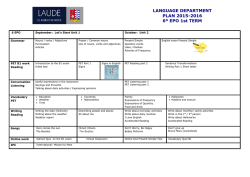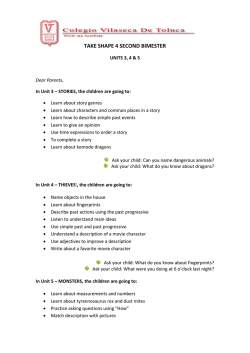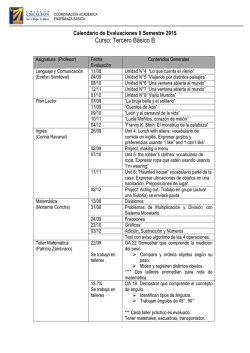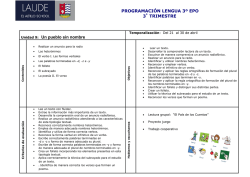
Objetivos Educativos 1º EPO
LANGUAGE DEPARTMENT PLAN 2015-2016 1º EPO 1st TERM 1º EPO High Five 1 September October Starter Unit: “Hello, friends.” Unit 1:”Ready for school.” Unit 2: “Happy birthday!” *Basic greetings. *Classroom objects. *To name toys. *Introducing yourself. *To ask about & give things to someone: “Where’s...?” * To describe favourite toys and *Colours. *Give and follow basic instructions (e.g. “Put the (book) on the their properties. *Numbers 1-10. (shelf).”) *Days of the week. *Classroom behaviour and class rules. Phonics Consonant sound r. Consonant sound s. Literacy A classroom poster. A birthday card. Helping each other. Understanding the importance of Reflecting on good behaviour and classroom tidiness. sharing. Thinking Skills Oral Expression Tell me about: Your name, your age, the days of the week, the colour of classroom objects and where they are, your favourite toys and their properties. Cambridge / Trinity Vocabulary Oral Drilling, Skills for Starters: Reading, Listening, Oral • • • Numbers 1 – 10 Colours Days of the week. Reading, Spelling & Writing • • • Classroom objects. Where’s...? Thank you. Prepositions in / on / under • • Toys. Adjectives to describe things. Nelson Spelling: Unit 1-9; Alphabet order; Phonics Revision; 1-30 Tricky words. Green Level Reading Books, Oxford Reading Tree Reading Scheme, Jolly Phonics Reading Books big books. Word and simple sentence level writing. To recognise words related to the units. Introduction to Punctuation (capital letters, full stop). Songs IPC The ten balloons chant. I’m ready for school. Happy birthday! Seven days a week. Let’s tidy up. My favourite toy. International: What Malaria is and how we can prevent it. // The way children in our host and home countries live. LANGUAGE DEPARTMENT PLAN 2015-2016 1º EPO 1st TERM 1º EPO High Five 1 November December Finish Unit 2 / Unit 3: “At the circus.” My project 1: Family / Festivals: Christmas *To identify and name different parts of the body *Identify and name family members * To describe other people’s hair and eyes *To provide basic information about your family *To name different feelings *To name different elements that form part of the Christmas culture and traditions. Phonics Consonant sound h. Literacy An action rhyme. A family Christmas card. A Class Christmas tree. A Christmas stocking. Thinking Skills Respect each other by learning about our similarities and Become aware and respect possible differences in family setups. differences. Reflect on differences in celebrating Christmas compared to one’s own customs and traditions. Oral Expression Tell me about: Your and other people’s physical appearance, the members of your family, how you celebrate Christmas. Cambridge / Trinity Vocabulary Oral Drilling, Skills for Starters: Reading, Listening, Oral • • Body parts. Describing hair and eyes. Reading, Spelling & • Family members. • Items related to Christmas. Nelson Spelling, Units 10-15: Consonant blends, phonics, tricky words. Writing Jolly Phonics Reading (Level 1, 2, 3) / Green Level reading books. Formulation of simple sentences, with regards to punctuation focus on capital letters and full stops. Songs IPC This is me. It’s fun to work together. My friend. Merry Christmas. International: What Malaria is and how we can prevent it. // The way children in our host and home countries live. Plan de Travail 1ºEPO 1er Trimestre 2015-2016 Du 8 septembre au 21 décembre -Bonjour Madame ! Bonjour Monsieur !Moi, c’est…. Et toi ? Ça va ? Au revoir ! Bonne journée ! -les chiffres du 0 à 12 -Il y a combien de doigts ? Supports -Nommer les personnages de la méthode. Vocabulaire -Saluer et prendre congé Vocabulaire Objectits UNITÉ 1 : Bonjour! Leçon 1 -Dialogues -Chanson : Je te dis bonjour ! -Apprendre à compter de 0 à 12 Supports Objectifs Leçon 2 -Chanson : 1, 2, 3 -Comment tu t’appelles ? Je m’appelle… -Tu as quel âge ? J’ai … ans -Chanson: Joyeux Anniversaire! Supports -Apprendre à se presenter (prénom et âge) Vocabulaire Objectifs Leçon 3 -De quelle couleur est la toupie ? -bleu, jaune, vert, rouge, violet, orange, noir, blanc -carré, triangle, rond, rectangle -Chanson: Ma toupie Jeu de la toupie Supports -Apprendre les couleurs -Apprendre les formes Vocabulaire Objectis Leçon 4 Leçon 5 -Qu’est-ce qu’il /qu’elle fait ? - Il / elle peint (peindre) Peins ! - Il / elle chante (chanter) chante ! - Il / elle saute (sauter) Saute ! - Il / elle téléphone (téléphoner) Téléphone ! - Il / elle apprend (apprendre) Apprends ! - Il / elle court (courir) Cours ! -Écoute, regarde et mime Supports Vocabulaire Objectifs -Apprendre quelques verbes -Vocabulaire de l’unité Fabrication d’un téléphone portable Supports -Revoir toutes les connaissances acquises Vocabulaire Objectifs RÉVISION DE L’UNITÉ 1 NOËL -Joyeux Noël ! Supports -Bonne Année ! Meilleurs vœux ! Vocabulaire Objectifs -Souhaiter une bonne année -Souhaiter les meilleurs voeux -Fabrication d’une carte de vœux -Chanson de Noël IPC PLAN 1º EPO 1st TERM September / October UNIT 1: SUPER HUMANS CONTENT In Science, we’ll be finding out: • What the main external parts of the body are called • What the five human senses are • How we can see, hear, smell, taste and touch • How the brain connects to other body parts • How to eat healthily and get enough exercise • How and why we use medicines • Why body hygiene is important In Technology, we’ll be finding out: • How to plan and prepare a healthy meal In International, we’ll be finding out: • What malaria is and how we can prevent it ASSESSMENT TEACHER’S ASSESSMENT Assessment takes place throughout the unit. The achievement of learning targets will be recorded on assessment sheets, providing evidence of your child’s learning in three specific areas: Knowledge – the ‘know about’ learning targets – will be assessed at the end of each subject component. Skills – the ‘be able to’ learning targets – will be observed and assessed whilst the children are doing them. Understanding – the ‘understand’ learning targets – will be evaluated by a judgement of observations carried out through the unit. SELF-ASSESSMENT The children will carry out their own assessment at the end of the unit. They will use the following headings to list their newly acquired knowledge, skills and understanding: • ‘New things I know about ’ • ‘New things that I can do’ • ‘New things I am beginning to understand’ Children will • What • What • What be asked to evaluate their learning did they do well? could they do better? did they find most/least interesting? IPC PLAN 1º EPO 1st TERM November / December UNIT 2: WHO AM I ? CONTENT In Society, we’ll be finding out: • About the different groups we belong to • About the things that make us feel happy • How to deal with anger • How to stay safe • How to make an emergency phone call In Art, we’ll be finding out: • How to draw portraits and self-portraits • How to take a portrait photograph • About portraits by famous painters and sculptors • How to design a favourite menu In Physical Education, we’ll be finding out: • What activities we can do well • How we can stay fit and strong In Science, we’ll be finding out: • About how our hearts work • About how we are similar to and different from other people • About different types of foods In Geography, we’ll be finding out: • Which countries we or our ancestors have come from • How to find our local area on a map • About different countries we have lived in In International, we’ll be finding out: About the way children in our host country and home countries live ASSESSMENT TEACHER’S ASSESSMENT Assessment takes place throughout the unit. The achievement of learning targets will be recorded on assessment sheets, providing evidence of your child’s learning in three specific areas: Knowledge – the ‘know about’ learning targets – will be assessed at the end of each subject component. Skills – the ‘be able to’ learning targets – will be observed and assessed whilst the children are doing them. Understanding – the ‘understand’ learning targets – will be evaluated by a judgement of observations carried out through the unit. SELF-ASSESSMENT The children will carry out their own assessment at the end of the unit. They will use the following headings to list their newly acquired knowledge, skills and understanding: • ‘New things I know about ’ • ‘New things that I can do’ • ‘New things I am beginning to understand’ Children will • What • What • What be asked to evaluate their learning did they do well? could they do better? did they find most/least interesting? PROGRAMACIÓN CURSO 1º EPO TEMA LENGUA Tenemos que saber… MATEMÁTICAS Tenemos que saber… VALORES NORMAS DE CONDUCTA Tema 1 - Escuchar y comprender textos adaptados a su nivel. - Leer palabras y oraciones con las letras m, p, l, s, t, d. - Utilizar los artículos en concordancia con el sustantivo. - Describir a una persona. - Escribir al dictado los números del 1 al 10. - Descomposición de forma auditiva. - Aplicar correctamente los conceptos ancho/estrecho delante, detrás,alto/bajo. - Resolver problemas con apoyo gráfico. El Orden. La familia. Lemas: - “Dejo la clase ordenada”. - “Soy ordenado con mis cosas”. - “Recojo mis juguetes”. Cuento: “Clementina y la lluvia”. En clase: - Cumplir los encargos. - Al terminar la jornada, dejar la clase ordenada. “El colegio”. La familia. En el comedor: - “Si te quieres a la mesa sentar, las manos tendrás que lavar”. - “Acepto mi sitio sin protestar”. En casa: - Levantarse y acostarse a la hora prevista. Temporalización: Primer Trimestre. RINCÓN DE APRENDIZAJE - Bits de inteligencia: Partes del cuerpo. - Bits de matemáticas: Signos matemáticos. - Carteles de palabras: m, p, l, s, t. - Poesías - Trabalenguas - Adivinanzas - Refranes - Canciones: “Mi cuerpo”. - Audición musical: “The Stars and Stripes forever” de John Philip Sousa. PROYECTOS DE FAMILIA. IPC : “Super humanos” Contenidos: El cuerpo humano, los sentido, comer sano, higiene, elaboración de menú sano. La doctora del centro dará la clase de cómo se elabora un menú sano. PROGRAMACIÓN CURSO 1º EPO TEMA LENGUA Tenemos que saber… MATEMÁTICAS Tenemos que saber… Tema 2 - Escuchar y comprender textos adaptados a su nivel. - Leer palabras y oraciones con las letras n, f, b, v, ca,co,cu, que, qui. - Utilizar los artículos indeterminados en concordancia con el sustantivo. - Escribir mayúsculas al inicio de la oración y punto al final. - Escribir al dictado los El Orden y la Obediencia. números del 10 al 20. - Sumar mentalmente números Lemas: dictado. -“Recojo mis juguetes”. - Amigos del 10, concepto de -“Hago mi tarea con orden”. decena. -“Obedezco a la primera”. - Resolver problemas de la vida cotidiana. Cuento: “La soledad de Perico”. -Series ascendente y descendente. -Profundizar en problemas resueltos planteando otras preguntas. “ Cosas de mayores”. “El cuerpo humano”. RINCÓN DE APRENDIZAJE Temporalización : Primer Trimestre. - Bits de inteligencia: España Bits de matemáticas: Líneas. Carteles de palabras: n, f, b, v, r, rr. Poesías Trabalenguas Adivinanzas Refranes Canciones: “Me cuido”. Audición musical:”Canon” de Johan Pachelbel. VALORES NORMAS DE CONDUCTA En clase: - “Terminar lo empezado”. - “Tirar los papeles a la papelera”. En el comedor: - “Utilizo la servilleta”. - “Me siento derecho”. En casa: - “Obedezco sin protestar”. PROYECTOS DE FAMILIA. IPC: “Super humanos” Contenidos : Hábitos sanos.Los órganos de los sentidos, conocimiento básico de los primeros auxilios. - Visita al aula de un especialista. (Padre médico, enfermera… PROGRAMACIÓN CURSO 1º EPO TEMA LENGUA Tenemos que saber… MATEMÁTICAS Tenemos que saber… Tema 3 - Escuchar y comprender textos adaptados a su nivel. - Leer y escribir palabras y oraciones con las letras g, c, qu, j, gü. - Clasificar sustantivos comunes y propios. - Escribir nombres propios con mayúscula. _ Signos de interrogación y exclamación. - Escribir al dictado los números del 20 al 30. - Restar mentalmente números dictados. - Agrupar elementos expresando la cantidad en decenas y unidades. - Resolver problemas cuya solución exija una resta. - Izquierda y derecha, número anterior y posterior. “El mago Simón” “Los alimentos.”Salud y enfermedad. VALORES La Obediencia. Lemas: - “Al terminar el recreo dejo de jugar”. - “Termino el trabajo cuando me lo dicen”. - “Obedezco con alegría”. Cuento: “La sonrisa de las piedras”. NORMAS DE CONDUCTA En clase: - “Dejar limpios los lavabos”. - “Respetar los objetos ajenos”. En el comedor: - “Nunca digo no me gusta”. - “Uso bien los cubiertos”. En casa: “Obedezco a mis padres”. Temporalización: Primer Trimestre RINCÓN DE APRENDIZAJE PROYECTOS DE FAMILIA. IPC: ¿Cómo nos sentimos? - Contenidos: Los alimentos. Receta de cocina. Colaboración de una madre para hacer una macedonia de frutas. – Bits de inteligencia: Comidas Típicas Bits de matemáticas: Decenas Carteles de palabras: ga, gue, gui, go, gu. Poesías Trabalenguas Adivinanzas Refranes Canciones: “Alimentación”. Audición musical:”La vendedora de alimentos” de Joseph Strauss. PROGRAMACIÓN CURSO 1º EPO TEMA LENGUA Tenemos que saber… Tema 4 - Escuchar y comprender textos adaptados a su “Los amuletos mágicos”. nivel. Pueblo y ciudad. - Leer palabras y oraciones con las letras z, c, h, ñ, x, ch. - Distinguir nombres masculinos y femeninos. - Completar y escribir palabras con r y rr. Temporalización: Primer Trimestre. MATEMÁTICAS Tenemos que saber… VALORES NORMAS DE CONDUCTA - Escribir al dictado los números del 30 al 40. - Suma de tres números sin llevada. - Escribir el número anterior y posterior a uno dado. - Resolver problemas con sumas o restas. - Sumar en horizontal. -Interpretación y descripción de croqusi e itinerarios. La generosidad. En clase: -Colgar la ropa en la percha. -Evitar arrastrar la silla. RINCÓN DE APRENDIZAJE - Bits de inteligencia: Pinturas Bits de matemáticas: Tablas de sumar Carteles de palabras: z, c, h, ñ, x, ch. Poesías Trabalenguas Adivinanzas Refranes Canciones: Villancico “La Navidad”. Audición musical:”Alegría en la tierra” de Haendel de la obra “El Mesías”. Lemas: - “Ayudo a los demás cuando lo necesitan”. - “Presto mis cosas a los demás”. - “Intento agradar en casa colaborando”. Cuento:”La seta en conserva”. En el comedor: - “Las manos sobre la mesa”. - “Antes de beber mi boca limpiaré”. En casa: -“Comparto mi tiempo con mi familia”. PROYECTOS DE FAMILIA. IPC “¿Cómo nos sentimos?” Contenidos: La familia. Conocernos a nosotros mismos, grupos. El pueblo y la ciudad. 1º PRIMARIA - PROGRAMACIÓN 2015 – 2016 MÚSICA / ART / PHYSICAL EDUCATION / INFORMÁTICA / AJEDREZ PRIMER TRIMESTRE Temporalización Septiembre Octubre -Apreciar la diferencia entre sonido y silencio. -Interiorizar y sentir el concepto de pulso. -Conocer algunos instrumentos escolares de pequeña percusión. -Trabajar la discriminación auditiva y la capacidad psicomotriz. Noviembre -Discriminar sonidos y ruidos en el entorno del hogar. -Tomar contacto con el pentagrama y la clave de sol. Diciembre -Conocer el sonido de la nota “sol” y su posición en el pentagrama. -Conocer la flauta y la gaita como inst. trandicionales. -Back to school for my summer. -All about me. -Reconocer las distintas partes del teclado. -Adquirir destrezas en el manejo del ratón. -Utilizar juegos didácticos (nubaris, kidpix) -Autumn. -Little Red Riding Hood -Halloween. -Entrar en la sesión utilizando usuario genérico. -Utilizar programas de mecanografía, "Keyboarding games" -Winter. -Christmas. -Adquirir nociones básicas sobre procesador de textos WORD. -Christmas -Utilizar el procesador de texto para elaborar la actividades relacionadas con IPC -Conocimiento y Desarrollo Corporal. -Conocimiento principales partes del cuerpo. -Conocer las reglas básicas de conducta. -Conocer el tablero. -Conocer el nombre de las distintas piezas. -Conocer la dominancia lateral a través de las diversas actividades motoras. -Participar en las actividades con gusto e interés. -Diferenciar las piezas por su forma. -Aprender el movimiento básico de las piezas. - Percepción espaciotemporal. -Participar en los juegos aceptando y respetando sus normas. -Conocer las reglas básicas de comportamiento en las partidas. -Adquirir el concepto de captura-cómo comen las piezas. Conocer los conceptos topológicos básicos: lejos-cerca, arribaabajo, delante-detrás a través del juego. -Iniciarse en la amenza y ataque con una pieza. -Ataque con cada una de las piezas.
© Copyright 2026



